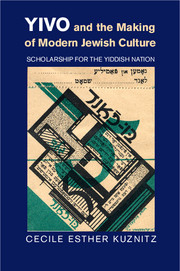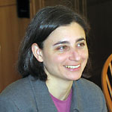 On Thursday, May 15, 2014 at 7:00pm, YIVO will celebrate the publication of Cecile Kuznitz's (Bard College) new book, YIVO and the Making of Modern Jewish Culture: Scholarship for the Yiddish Nation (Cambridge University Press), the first history of YIVO, with a roundtable exploring the history of YIVO, its role in Jewish nationalism, and the relationship between Jewish cultural and political work in interwar Eastern Europe.
On Thursday, May 15, 2014 at 7:00pm, YIVO will celebrate the publication of Cecile Kuznitz's (Bard College) new book, YIVO and the Making of Modern Jewish Culture: Scholarship for the Yiddish Nation (Cambridge University Press), the first history of YIVO, with a roundtable exploring the history of YIVO, its role in Jewish nationalism, and the relationship between Jewish cultural and political work in interwar Eastern Europe.
Panelists will include: Cecile Kuznitz, Bard College; Samuel Kassow, Trinity College; Simon Rabinovitch, Boston University; Steven Zipperstein, Moderator, Stanford University and Kronhill Scholar at YIVO.
Attend the event.
Buy the book.
 Cecile Kuznitz
Cecile KuznitzCecile Kuznitz is Associate Professor of Jewish history and Director of Jewish Studies at Bard College. She received her Ph.D. in modern Jewish history from Stanford University and previously taught at Georgetown University. She has held fellowships at the US Holocaust Memorial Museum, the Oxford Centre for Hebrew and Jewish Studies, and the Center for Advanced Judaic Studies at the University of Pennsylvania. In summer 2013 she was a Visiting Scholar at Vilnius University. She is the author of several articles on the history of the YIVO Institute for Jewish Research, the Jewish community of Vilna, and the field of Yiddish Studies.
She is interviewed here by Yedies Editor Roberta Newman.
RN: Why did you feel that the history of YIVO was significant enough a topic for a full-length history? Was there a gap in the literature?
CK: When I was first looking for a dissertation topic in graduate school, several people independently mentioned writing the history of YIVO because there seemed to be a very significant gap in the scholarly literature. If Yiddish-speaking Jews were a kind of national group with their own government it would have been a given that somebody would have published a history of their national academy and library. It would go without saying how significant that was. But Yiddish-speaking Jewry didn't have government funding behind it. There was no national university, no national research institute with government funding that would have, as a matter of course, sponsored the writing of its own history. I think part of the issue is that YIVO came out of a Diaspora Nationalist orientation, and it was carrying out all its work without government support.
But I also think another factor is that a certain amount of time needed to elapse since the prewar period when YIVO was founded and was carrying out its work. Because YIVO grew out of political movements that were very active during that era, a certain amount of time had to pass to allow the heated arguments and rivalries between Zionists and Diaspora Nationalists, between Hebraicists and Yiddishists, and all of those competing movements to cool down somewhat. A new generation of historians that was not so directly involved in these ideological battles can now step back a little bit and look at the history of an institution like YIVO with some distance, a little bit more dispassion than the founding generation itself who invested in the institutions and also came out of certain political orientations would have been able to.
RN: Could the neglect of YIVO in the scholarship also have been because YIVO has been marginalized in the Jewish world since the Holocaust?
CK: For people who are in this field, who are specialists, it's obvious that the history of YIVO is very important and that YIVO is a very important institution but I think you're right that in the larger landscape of American Jewish society or of Jewish studies writ large that the whole field of Yiddish studies is something that has been somewhat marginalized. Diaspora Nationalism is something that is seen as having lost out historically to the Zionist movement, and, therefore, it's not as important somehow. This is something I try to talk about in the conclusion of my book. There's a gap between the people who are sympathetic to what YIVO is about (whether they were involved with the institute directly, just supported it, or just appreciate what it stood for) and who saw YIVO as the pinnacle of a movement that encompassed all of Yiddish-speaking Jewry (that at one time was over ten million people) and other people who don't appreciate that. They see YIVO as a small academic institution that's on the margins of Jewish life and maybe don't immediately realize why it's important.
RN: How much did YIVO being located in Vilna shape it as an academic institution?
CK: Well, I would say that it shaped it very decisively. One of the things I talk about in the book is that in retrospect many people wrote that YIVO could only have been founded in Vilna. But, in fact, it took quite a while for the founders to settle on Vilna as the headquarters. Nevertheless, it became obvious very quickly that the institute had the most support in Vilna and in the region around Vilna. And in fact, at that time, in the interwar period when YIVO was founded, Vilna was also the center of the Yiddish secular school network and the center of a very active literary scene, as well as a vibrant press and theater. This allowed YIVO to flourish not only as a small, academic, research-oriented institute but also as something that was tied into a whole network of Yiddish cultural institutes that were trying to cultivate a mass audience in the interwar period. And that wouldn't have happened if YIVO had remained in Berlin, where the initial plan for the institute was formulated.
RN: Was there a tension between YIVO’s activities as an academic institution and its desire to play an important role in the Jewish community?
CK: The role of politics in YIVO's work was always a very fraught question. Max Weinreich and the main leaders of YIVO always insisted that YIVO should be politically neutral. But there were other supporters of YIVO who wanted YIVO to take an open stand in favor of socialism, and then, of course, there were critics external to YIVO who supported Zionism or Communism who were critical of YIVO for their own reasons. So even though the majority of YIVO's leaders always supported the idea of YIVO as a neutral institute that was non-partisan and above political strife, this political strife was inevitable. YIVO always faced pressures from both internal and external critics who wanted YIVO to affiliate with particular political views.
The other aspect to this was that there was also a debate within YIVO over whether it should focus on publications and programs that were purely for a scholarly audience or on projects that were more popular, that were designed to be more accessible to a wider audience. I feel that this was a tension that was never really resolved. On one hand, since YIVO saw itself as an institute representing the folk, representing all Yiddish-speaking Jewry, including the poor, uneducated masses, they always in theory supported the idea that they should be producing not just specialized writing, not just specialized publishing and monographs, but also publishing self-study guides that workers could use at home in the evenings. But, at the end of the day, because its resources were so limited, YIVO always came back to focusing on its scholarly mission, until the very end of the prewar period, when it began to pay a little more attention to the so-called popular projects. There was always a tension between YIVO's rhetoric of serving the folk and the reality that it really was an academic institute.
RN: YIVO set itself up to be the headquarters of and the authority on Yiddish. What role did it see Yiddish playing in the political development of the Jewish people in the Diaspora?
CK: The founders and supporters of YIVO were rooted in the ideology of Diaspora Nationalism, which saw Yiddish as the national Jewish language. Of course, this grew out of the nineteenth-century nationalist idea that language is a key component of national culture. So, for the Jews to argue that, as a minority in the Diaspora, they should be recognized as a national group and that they deserved national rights, they needed to have their own national language. And for these people, that was Yiddish. Winning respect for Yiddish and helping to further develop Yiddish from a vernacular language to a language of high culture had political implications in terms of winning rights for Jews and recognition as a national minority. It also had a kind of psychological aspect: that the language of the common Jew won respect, and that meant that ordinary Jews could also win respect for themselves. So developing and standardizing research in Yiddish was seen as a national movement by YIVO's founders. And, in theory, in their definition of the scope of YIVO's work, they didn't confine themselves only to research in Yiddish or research into Yiddish-speaking Jewry. But, again, in practice, because their resources were limited, the latter was what really remained at the center of their program.
RN: How did YIVO's mission and activities change in the 1930s in the face of worsening conditions for Jews?
CK: Some of the pressures with regard to politics that I mentioned intensified in the mid- and late 1930s, with the creation of the Popular Front and of course with the rise of Hitler. There was increasing pressure to unify the left in the face of fascism. At the same time, when the situation was deteriorating, there was a discussion among YIVO leaders about how to respond to the changing conditions and there were some efforts to address the pressing topics of the day, to discuss them, explicitly. And there was also more of an effort to finally launch some of the so-called popular projects. So, for example, the journal Yidishe ekonomik, which was designed to be a more accessible, popular journal of YIVO’s Economic Statistical Section, finally started to appear in 1937. Yidishe ekonomik had articles on topics like migration, unemployment, and what was then happening in Nazi Germany. So there was more of an effort to try to address issues that had very practical, current applications at that time.
RN: When did your own personal interest in YIVO begin?
CK: When I graduated college with my undergraduate degree I got a job in the YIVO Archives and at that time I knew a little bit of Yiddish from having studied it informally as an undergraduate. And while I was working at the YIVO Archives, I learned a lot more about YIVO, I learned a lot more about East European Jewish culture, and I learned a lot more Yiddish! So, eventually, I decided to go to graduate school to pursue a Ph.D. in Jewish History at Stanford under Professor Steven Zipperstein. And when I was looking for a topic for a dissertation, writing about the history of YIVO seemed like a good fit because I had both worked in the archives and had studied the period in graduate school.